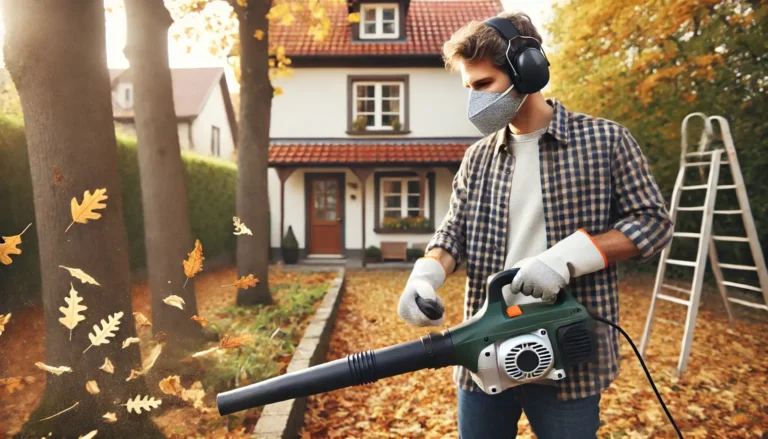If you suffer from heusphatian tube dysfunction, you may experience ear pressure, muffled hearing, or discomfort, especially when exposed to loud noises or strong air pressure. This raises an important question: can you use a leaf blower wit heusphatian tube dysfunction? Leaf blowers generate high noise levels and forceful air movement, both of which can impact the delicate balance in your ears.
For those dealing with heusphatian tube dysfunction, it is essential to understand how noise and air pressure from a leaf blower might affect your condition. This article will explore whether can you use a leaf blower wit heusphatian tube dysfunction safely and what precautions you can take to prevent further discomfort.
Understanding Heusphatian Tube Dysfunction
The heusphatian tubes are narrow passageways that connect the middle ear to the back of the throat. They help regulate ear pressure, drain fluid, and maintain balance. When these tubes fail to function properly, it results in heusphatian tube dysfunction, which can lead to a range of symptoms.
Symptoms of Heusphatian Tube Dysfunction
- A clogged or full sensation in the ears
- Popping or clicking sounds when swallowing
- Muffled hearing or temporary hearing loss
- Ear pain and discomfort
- Dizziness or balance problems
If you frequently experience these symptoms, you may wonder, can you use a leaf blower wit heusphatian tube dysfunction without worsening your condition? To answer this, let’s examine how noise and air pressure from leaf blowers affect the ears.
How Loud Noises from Leaf Blowers Impact Heusphatian Tube Dysfunction
Leaf blowers typically produce noise levels between 85 to 100 decibels, which is loud enough to cause hearing damage and ear pressure issues. If you already suffer from heusphatian tube dysfunction, exposure to high-decibel noise may intensify your symptoms.
The Effect of Loud Noise on Heusphatian Tube Dysfunction
- Increases ear pressure, leading to greater discomfort
- Causes temporary hearing sensitivity or muffled hearing
- Worsens the sensation of fullness in the ears
- May trigger tinnitus (ringing in the ears)
For those asking, can you use a leaf blower wit heusphatian tube dysfunction without affecting your ears?, the answer depends on the level of noise protection and other precautions you take.
The Impact of Air Pressure from Leaf Blowers on Heusphatian Tube Dysfunction
Apart from noise, leaf blowers create strong air pressure, which can stir up dust, pollen, and debris. If you have heusphatian tube dysfunction, exposure to airborne irritants may cause nasal congestion, making it harder for your ears to regulate pressure properly.
How Airborne Irritants Affect Heusphatian Tube Dysfunction
- Dust and pollen can trigger allergies, increasing mucus buildup and worsening symptoms.
- Dry air from the blower can irritate nasal passages, leading to congestion and pressure imbalances.
- Rapid air movement may cause subtle pressure fluctuations, increasing discomfort in the middle ear.
With this in mind, can you use a leaf blower wit heusphatian tube dysfunction without experiencing discomfort? It is possible, but taking precautions is crucial.
Precautions for Using a Leaf Blower with Heusphatian Tube Dysfunction
If you must use a leaf blower despite having heusphatian tube dysfunction, follow these safety tips to protect your ears:
Wear Hearing Protection
Using earmuffs or earplugs can reduce noise exposure, helping to prevent additional strain on your heusphatian tubes. Look for protection that reduces noise by at least 25 to 30 decibels.
Choose a Low-Noise Leaf Blower
Gas-powered blowers are the loudest, while electric or battery-operated models tend to be quieter. If you are wondering, can you use a leaf blower wit heusphatian tube dysfunction more safely?, switching to a quieter blower can help.
Limit Exposure and Take Breaks
Avoid continuous exposure to the loud noise and air pressure generated by a leaf blower. Take breaks every 10-15 minutes to relieve pressure in your ears.
Stay Upwind to Reduce Airborne Irritants
When using a leaf blower, try to position yourself upwind to prevent inhaling dust and debris, which may contribute to sinus congestion and further block your heusphatian tubes.
Consider Alternative Yard Maintenance Methods
If using a leaf blower worsens your symptoms, consider alternative solutions such as:
- Using a rake – This is quieter and avoids air pressure fluctuations.
- Leaf vacuums – These machines collect leaves without blowing debris into the air.
- Hiring landscaping services – If symptoms are severe, outsourcing yard maintenance may be the best choice.
By following these steps, you may reduce the risks associated with heusphatian tube dysfunction when using a leaf blower.
Can You Use a Leaf Blower wit Heusphatian Tube Dysfunction?
The answer to can you use a leaf blower wit heusphatian tube dysfunction depends on how well you protect yourself. Since leaf blowers produce loud noise and strong air pressure, they can worsen heusphatian tube dysfunction symptoms, but taking precautions—such as wearing ear protection, limiting exposure, and choosing a quieter model—can help reduce risks.
If using a leaf blower leads to increased ear discomfort or worsened heusphatian tube dysfunction symptoms, consider alternative yard maintenance methods or consult a healthcare professional. Listening to your body is essential—if symptoms worsen, avoiding leaf blowers may be the best choice.
FAQs
1. Can using a leaf blower make heusphatian tube dysfunction worse?
Yes, loud noise and strong air pressure from leaf blowers can increase ear pressure, causing discomfort and worsening heusphatian tube dysfunction symptoms.
2. What is the best way to protect my ears while using a leaf blower?
Wear noise-canceling earmuffs or earplugs, take breaks, and use a low-noise blower to minimize discomfort.
3. Are electric leaf blowers better for people with heusphatian tube dysfunction?
Yes, electric and battery-powered leaf blowers are quieter than gas-powered models, making them a better option for individuals with heusphatian tube dysfunction.
4. How can I prevent dust and allergens from worsening heusphatian tube dysfunction while using a leaf blower?
Wear a dust mask, stay upwind, and use a low-power setting to minimize airborne irritants.
5. Should I avoid using a leaf blower completely if I have heusphatian tube dysfunction?
If using a leaf blower worsens your symptoms, consider alternative methods like raking or using a leaf vacuum. If symptoms persist, consult a doctor.

